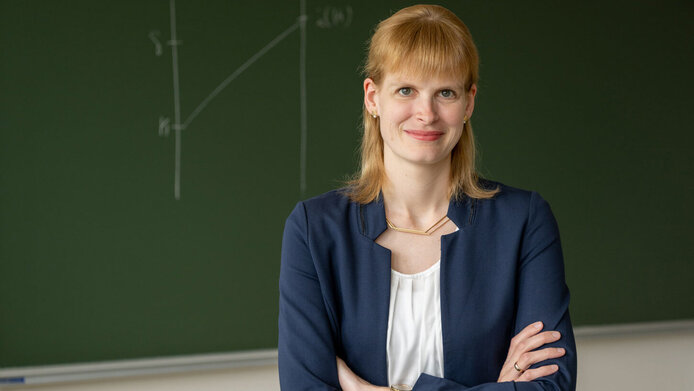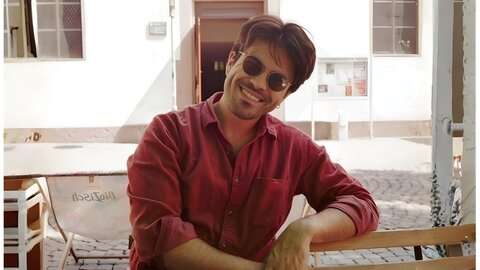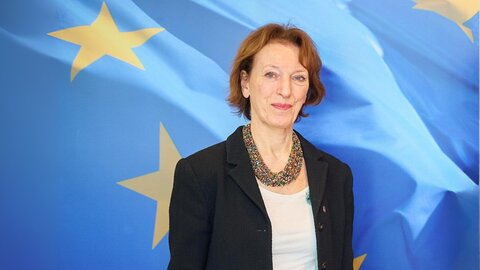Searching for infinity

You study so-called Woodin cardinal numbers. Can you give us a brief overview of your field of research?
Sandra Müller: Most people are familiar with natural numbers, such as 0, 1, 2, 3, which can go on infinitely. But even larger numbers than this kind of infinity can be formed. The simplest variant would be to expand the set of natural numbers to include another set, which is to say infinity + 1. But you can also form a so-called power set, which is a set that encompasses all subsets. Subsets of natural numbers are, for example, all even numbers, all numbers that are divisible by three, by four, and many more.
Over 100 years ago German mathematician Georg Cantor demonstrated that the set containing the subsets of the natural numbers is much larger than the set of natural numbers itself. You can take this to new levels and form power sets of power sets and so on. These kinds of infinities can be used to construct cardinal numbers as a means of indicating the size of an infinity. Woodin cardinal numbers are special because of their very particular properties. Among other things, they enable series of numbers to be reproduced in a complex manner, which is relevant to the study of cardinal number theory. Mathematically speaking, however, we can neither prove nor disprove that Woodin cardinal numbers exist at all.
How do you approach this problem if proving their existence is impossible?
Müller: In inner model theory, we construct standard models that underpin the assumption that large cardinal numbers, such as Woodin cardinal numbers, are meaningful objects and not arbitrary. The natural number system is based on axioms, which are basic assumptions that cannot be proved further, such as that 2+1 is the same as 1+2. We are also looking for similar axioms for the worlds of cardinal numbers. Back in the 1960s, the creative term for these inner models was “mice”. Another possibility is to apply the axiom of determinacy. Here, we experiment with winning strategies in long two-person games, such as looking for the largest number. Analysing the strategy, like when I always take the other person's number and add one to it, allows us to determine the winner without having to wait for an infinite number of rounds to be completed. The research fields for large cardinal numbers and the axiom of determinacy were developed independently of one another. It was not until the 1980s that US mathematicians D. A. Martin, J. R. Steel and W. H. Woodin proved that significant connections between the fields exist. They became the founders of my field of research, and I will be working with two of them in my START project.
What specific research questions do you plan to address?
Müller: I would like to further close the gap and link large cardinal numbers and determinacy even more closely. One can connect Woodin cardinal numbers in an extremely complex structure to form a limit of infinities. Proving the properties of this limit is not possible using existing methods. I plan to use my START project to develop new methods to do this.
What are the first steps?
Müller: I will be travelling a lot in the summer. The pandemic meant that conferences were held online only for a long time, and I am now able exchange ideas with colleagues in person again. This also gives me the opportunity to directly reach out to potential candidates who can join my working group.
What motivates you in your day-to-day research?
Müller: Large cardinal numbers and winning strategies are mathematical theories that at first glance have little to do with each other and yet describe the same phenomenon. I have wanted to study this problem more in-depth ever since I first learned about it. As a mathematician, I don't have a job that allows you to lay your work aside at the end of the day. You always take mathematical problems home with you. It becomes part of you, and that's how you end up solving them.
Do you have role models who inspire you in your work?
Müller: I originally studied computer science and then switched to mathematics. My father inspired me to pursue technical studies as a woman. He never graduated from university himself, but he and I often tinkered with computers together when I was a child. When I was 15, I attended university computer science lectures for the first time. Back then, I didn't question the fact that I was often the only woman in the lectures. My father had never made me feel that building computer systems was something a woman couldn't or shouldn't do. It is important for future generations to have female role models, to see, for example, that there are female professors in this field.
Sandra Müller completed her PhD in mathematics at the University of Münster in 2016. She was a postdoc, university assistant and L'Oréal Austria Fellow at the Faculty of Mathematics at the University of Vienna until 2021. Since then, the German-born researcher has been working at the Institute for Discrete Mathematics and Geometry at the Vienna University of Technology (TU) as part of the FWF Elise Richter Career Programme.
About the project
The project “Determinacy and Woodin limits of Woodin Cardinals” seeks to extend the theoretical basis for mathematics. It aims to link two different approaches more closely: large cardinals describing various infinitely large sets on the one hand, and the determinacy axiom that produces winning strategies in so-called two-person games on the other hand.
The START Prize
The START Programme of the Austrian Science Fund FWF is aimed at outstanding young researchers, giving them the opportunity to plan their research over an extended period and with a high degree of financial security. It is endowed with up to EUR 1.2 million and is one of Austria’s most prestigious and most highly endowed awards alongside the Wittgenstein Award.





